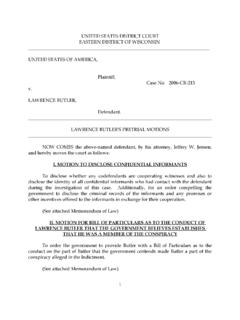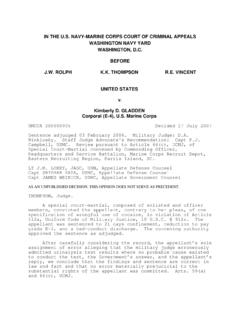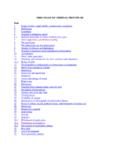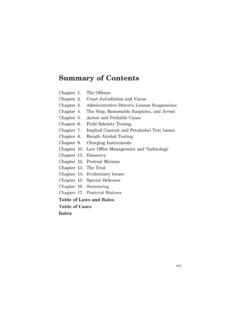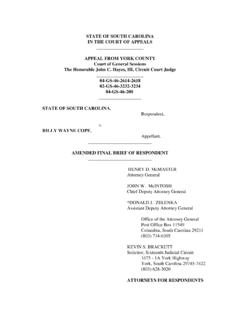Transcription of A District Court suppresses the evidence against a ...
1 2018 Online Article: Link to article online: Article Source : In United States v. Hernandez, 2017 WL 5167222 (D. Colo. Nov. 7, 2017), the United States District Court for the District of Colorado was asked to determine whether Denver Colorado Police Officer Christopher Valko s search of Defendant Emilio Hernandez s vehicle was unconstitutional and whether, as a result, the evidence that Officer Valko discovered should be suppressed. The relevant facts are as follows. On April 1, 2017, Officer Valko was driving eastbound on a busy section of I 70 when he clocked Hernandez driving in excess of the posted speed limit. Accordingly, Officer Valko initiated a lawful traffic stop of Hernandez s vehicle. Hernandez produced a valid Colorado ID card, but he was unable to produce a valid driver s license. The passenger was also unable to produce a valid driver s license. Officer Valko then discovered that Hernandez s driver s license was suspended.
2 So, Officer Valko prepared citations for speeding and for driving on a suspended license and issued them to Hernandez. While doing so, Officer Valko told his fellow cover officer that he was going to do a proof and get them out of here. Officer Valko added, I ll just park and lock the car I guess. I don t know. They can t drive. Officer Valko returned to Hernandez s vehicle and asked him to step out of the car and away from traffic to sign some paperwork. After completing that paperwork, Officer Valko asked Hernandez if there was anyone who could pick up the car because neither Hernandez nor the passenger was able to drive the vehicle. Hernandez responded, yeah. Hernandez then gestured toward Pecos Street and made a number of inaudible comments. Before Mr. Hernandez finished responding, however, Officer Valko cut him off and asked, Is there anything in the car that shouldn t be? Hernandez responded, No. Officer Valko then asked if he could search the car.
3 Officer Valko twice told Hernandez that he had a right to refuse the search. Hernandez s responses were inaudible, but the parties agreed at the evidentiary hearing on Hernandez s motion to suppress that Hernandez did not consent to Officer Valko s search of the vehicle. Officer Valko then made the statement, You know, most guys would tow that car since you can t be driving it, and again asked, Is there anything in there that I m going to find? Hernandez responded, No. Nevertheless, Officer Valko proceeded to search the car. Officer Valko looked on the front passenger seat, opened and looked in the glove compartment, and then opened and looked in the center console. Officer Valko also flashed his light in the back seat. Finally, Officer Valko reached under the driver s seat where he found a loaded firearm. Hernandez subsequently admitted that the firearm belonged to him. In his motion to suppress, Hernandez disputed the legality of Officer s Valko s search, primarily arguing that Officer Valko s search was for no other reason than to conduct a criminal investigation, to look for contraband which requires either consent or a warrant.
4 The Government responded that Officer Valko s search was a lawful inventory search pursuant to established Denver Police Department policies and A District Court suppresses the evidence against a Defendant after concluding that the law enforcement officer s search of the Defendant s vehicle was unconstitutional February 2018 For duplication & redistribution of this article, please contact Public Agency Training Council by phone at PATC 5235 Decatur Blvd Indianapolis, IN 46241 2018 Online Article: Link to article online: procedures, adding that, even if the search was unconstitutional, the firearm inevitably would have been discovered pursuant to these policies. The Government also contends that Hernandez had no standing to object to the search. After conducting an evidentiary hearing on Hernandez s motion to suppress, the District Court began its analysis of Hernandez s motion by addressing the standing argument first.
5 The District Court explained that Fourth Amendment rights are personal and cannot be claimed vicariously. United States v. Valdez Hocker, 333 1206, 1208 (10th Cir. 2003). Moreover, the criminal defendant who filed the motion to suppress bears the burden of adducing facts at the suppression hearing indicating that his own rights were violated by the challenged search. The standing question centers on the classic Fourth Amendment test: whether the defendant manifested a subjective expectation of privacy in the area searched and whether society is prepared to recognize that expectation as objectively reasonable. United States v. Eckhart, 569 1263, 1274 (10th Cir. 2009). When (like here) the defendant is not the registered owner of the car that was subjected to the search, although he need not submit legal documentation showing a chain of lawful custody from the registered owner to himself, he nonetheless bears the burden of establishing that he gained possession from the owner or someone with authority to grant possession.
6 He must advance evidence establishing a link between himself and the registered owner. After considering the evidence presented at the suppression hearing, the District Court determined that Hernandez possessed standing to file the motion to suppress. Hernandez testified at the suppression hearing that the car s registered owner, Rena Grant, gave him permission to use it. Moreover, Officer Valko testified that Rena Grant was, indeed, the registered owner of the vehicle. Accordingly, the District Court held that Hernandez possessed the standing necessary to file the motion to suppress and to contend that Officer Valko s search violated his Fourth Amendment rights. Next, the District Court considered whether Officer Valko s search itself was unconstitutional. The District Court began by stating that [s]earches conducted outside the judicial process without prior approval by judge or magistrate are per se unreasonable under the Fourth Amendment subject only to a few specifically established and well-delineated exceptions.
7 Arizona v. Gant, 1556 332, 338 (2009). Among the well-defined exceptions to the warrant requirement is an inventory search. Colorado v. Bertine, 479 367, 371 (1987). It is common practice for the police to conduct an inventory of the contents of vehicles that they have taken into their custody or are about to impound. Inventory searches are not treated as investigative searches because they serve three administrative purposes: the protection of the owner s property while it remains in police custody, the protection of the police against claims or disputes over lost or stolen property, and the protection of the police from potential danger. South Dakota v. Opperman, 428 364, 369 (1976). Although inventory searches need not be supported by a warrant or probable cause, they are restricted in other ways. First, they are reasonable only if conducted according to standardized procedures. Second, [t]he policy or practice governing inventory searches should be designed to produce an inventory.
8 Florida v. Wells, 495 1, 4 (1990). Third, the search cannot be investigatory in nature but must instead be used only as a tool to record the defendant s belongings to protect the police from potential liability. An inventory search conducted for the sole purpose of investigation, to uncover contraband, is not constitutionally permissible. In the instant case, the District Court held that Officer Valko s search failed all three criteria. The District Court found that Officer Valko s search was not conducted according to the standardized procedures of the Denver Police Department. Although he acknowledged that he was aware of and had been trained regarding the procedures, Officer Valko conceded that he did not complete an Impounded/Recovered Report, nor did he create an inventory list of the items in the car as required by the Denver Police Department policies and procedures. 2018 Online Article: Link to article online: Second, when questioned about why he did not complete an inventory list in accordance with the Denver Police Department policy, Officer Valko testified that he was conducting a search for dangerous items and for contraband for safety purposes rather than to preserve personal property.
9 Officer Valko further testified that such a search is common practice among Denver Police Department officers who plan to either park and lock or impound a vehicle. The District Court opined that, to the extent that this is true, such a practice does not comply with the Denver Police Department s own operations manual and would constitute an unconstitutional search because it goes far beyond a search designed to produce an inventory. Third, the District Court found that all of the evidence , including the body-camera video and Officer Valko s testimony, indicated that Officer Valko was conducting his search of Hernandez s vehicle for the sole purpose of investigation, not to inventory items in preparation for impoundment. In finding that the third criteria had not been satisfied, the District Court relied heavily on Officer Valko s repeated statements that, at the time he searched the car, he had still not determined that he was going to tow the vehicle and that he did not make that determination until after he conducted the search and had arrested Hernandez.
10 Accordingly, the District Court held that Officer Valko s search of Hernandez s vehicle was not a permissible inventory search. Instead, it was a warrantless search for which no exception to the warrant requirement applied. Finally, the District Court rejected the Government s argument that the evidence should not be suppressed based upon the inevitable discovery doctrine. The inevitable discovery doctrine provides an exception to the exclusionary rule and permits evidence to be admitted if an independent, lawful police investigation inevitably would have discovered it. The burden rests on the government to prove by a preponderance of the evidence that the evidence at issue would have been discovered without the Fourth Amendment violation. In this case, the District Court rejected the Government s inevitable discovery argument because the Government had failed to show that no alternatives existed to the police removal of the car from the highway.






